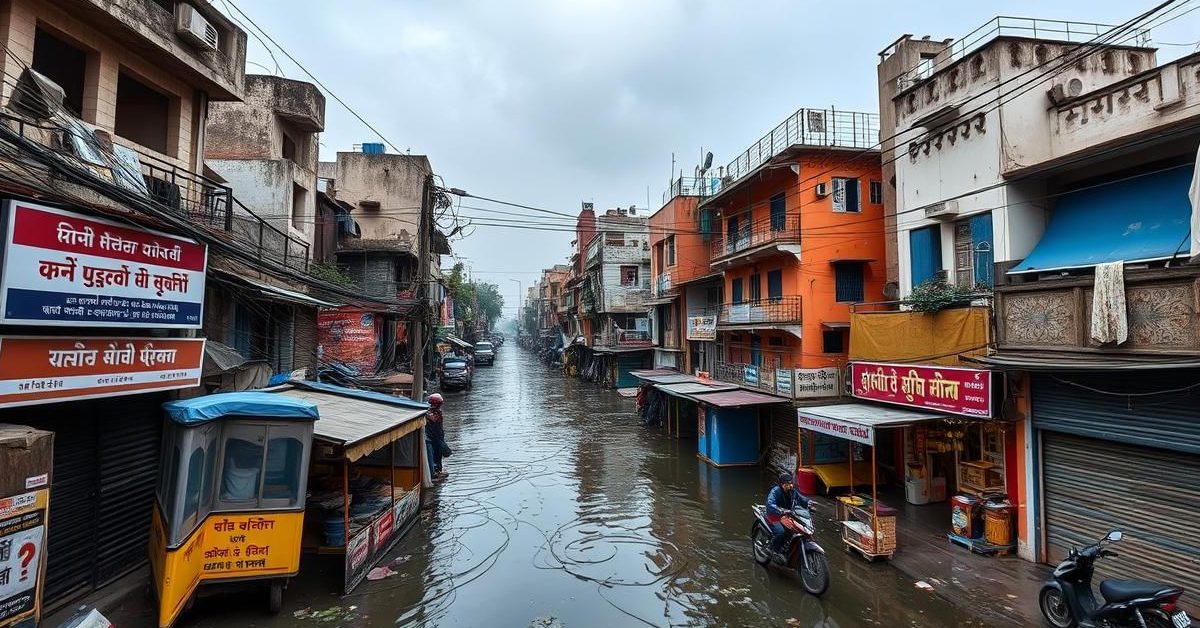Old Rajinder Nagar, once a bustling hub for UPSC aspirants, has seen its landscape dramatically altered a year after a tragic basement library flooding incident.
A Changing Coaching Landscape
The energy that once defined Old Rajinder Nagar is fading. Student numbers have visibly declined, with libraries appearing half-empty and many local businesses struggling to stay afloat.
Ankit Singh Chauhan, a 29-year-old UPSC aspirant and mentor, notes a significant drop in students living in the area. Coaching institutes are feeling the pinch, as fewer students mean less business.
The tragic 2024 incident reshaped the entire coaching ecosystem, according to Jatin Verma, founder of JV’s IAS. Concerns about safety among parents led to a sharp decrease in offline enrollments.
Students are now choosing online or hybrid learning modes, a major shift from the previous preference for traditional classroom settings. This has forced many coaching centers to adapt, with some moving entirely digital.
Even local accommodation providers are feeling the impact. Tarun Kumar Samanta, who runs a PG, reports a significant drop in daily inquiries for rooms.
The End of Underground Libraries
The tragedy also highlighted the dangers of unsafe, often illegal, underground libraries. These spaces, once popular for their amenities, are now a rarity.
Many basements have been repurposed into gyms, yoga centers, or warehouses, as aspirants and authorities steer clear of them. Some libraries have moved to upper floors, but at a higher cost.
Rents for first and second-floor spaces can be double or triple that of basements, leading to increased membership fees. This makes them unaffordable for many students.
Despite the shift, safety remains a concern, even on upper floors. Divya Pandey, a four-time UPSC aspirant, points out that many libraries still fail to meet fire safety standards, especially regarding exits.
The Burden of High Living Costs
Living in Old Rajinder Nagar has become financially challenging for many aspirants. Despite the decline in student population, accommodation rents remain high.
Nishee Verma, a 28-year-old from Chhattisgarh, spends between Rs 25,000 and Rs 30,000 monthly, including Rs 15,000 for her PG room. Rahul Gupta, another aspirant, states that accommodation rents have risen by over 50% in the last two years.
Local Businesses Face Tough Times
The impact extends beyond students and coaching centers to the local businesses that relied on their presence. Stationery shops and bookstores are particularly hard hit.
Manish Kumar, who ran a stationery and photocopy shop for years, has already relocated. He reports a drastic drop in daily sales, from Rs 25,000-30,000 to less than Rs 2,000.
Mahesh Kumar, a bookstore owner, has seen his sales plummet by 50 percent. He notes that students now prefer more affordable online coaching and often order materials to be couriered to their hometowns.
Infrastructure Improvements, But Gaps Remain
A year later, some positive changes have been implemented. A water pump near the incident site helps prevent flooding, a welcome development for residents.
However, broader safety issues persist. Hanging live wires during monsoon seasons are a major hazard. While Old Rajinder Nagar has seen some drainage improvements, neighboring areas like Shadipur and Patel Nagar still face issues.
Key Takeaways
- The tragic 2024 flooding incident led to a significant decline in student footfall and a shift towards online learning in Old Rajinder Nagar.
- Once-popular underground libraries have largely disappeared due to safety concerns, and surviving libraries face higher operating costs.
- High living expenses in the area, including soaring rents, are making it unaffordable for many aspirants.
- Local businesses, from stationery shops to bookstores, are struggling to survive due to the reduced student population.
- While some infrastructure improvements have been made, critical safety and drainage issues persist in the broader area.
Old Rajinder Nagar is at a crossroads, struggling to maintain its identity as India’s premier UPSC coaching hub amid rising costs, safety concerns, and the growing appeal of online education.















